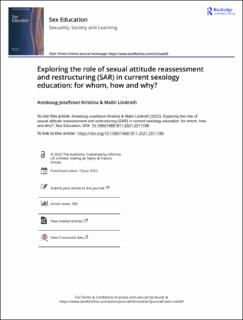Exploring the role of sexual attitude reassessment and restructuring (SAR) in current sexology education: for whom, how and why?
Peer reviewed, Journal article
Published version
Permanent lenke
https://hdl.handle.net/11250/3037487Utgivelsesdato
2022-01-13Metadata
Vis full innførselSamlinger
Originalversjon
https://doi.org/10.1080/14681811.2021.2011188Sammendrag
As concerns about sexual and reproductive health and rights become integrated into public health policies, the demand for higher education in sexology rises. There is a need therefore to evaluate established pedagogical methods to ensure that they are relevant, efficient and lead to valuable competencies. This study explored the current evidence and pedagogical relevance for Sexual Attitude Reassessment and restructuring (SAR) as part of professional higher education in sexology. A systematic review was conducted with eleven included publications. Data were synthesised across studies and presented narratively. The publications were generally old and derive from a small pool of researchers geographically centred to the USA. Several studies were based on small numbers of participants, display a great variety in types of participants, use different evaluation instruments (mostly unvalidated), and a variety of methods to measure the results of SAR. Furthermore, long-term follow-up has been rare. Extensive, high-quality, and up-to-date research for SAR as an effective pedagogical method for use in sexology higher education for professionals today is lacking. Digital solutions focusing on broadening students sexological self-awareness appear more feasible than SAR, and suitable pedagogical and digital solutions need to be developed and evaluated to ensure high-quality teaching of sexology in higher education.

